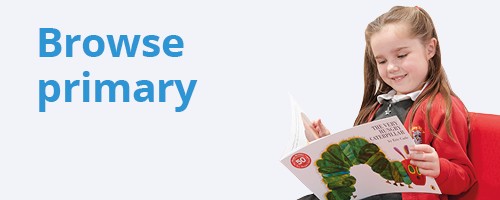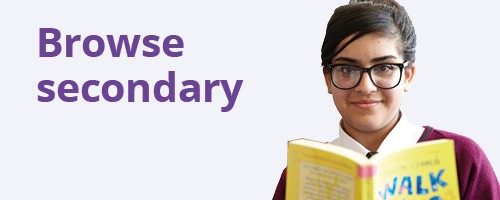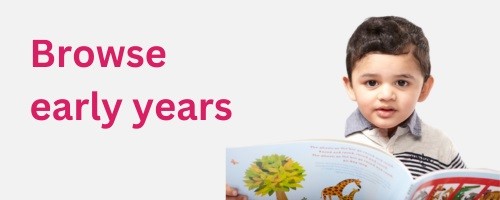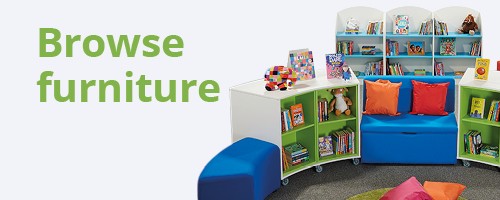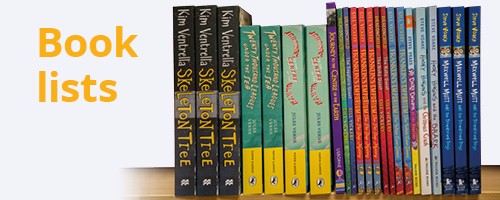For help, advice and telephone ordering call our team on 0121 666 6646
Are you sure you wish to delete this basket?()
This action cannot be undone.
Sorry, something went wrong
Please report the problem here.
Q&A with Ros Harding, School Librarian of the Year 2019

July 16th 2019
Ros Harding, of The King's School, Chester, has been awarded the SLA's School Librarian of the Year Award for 2019. We caught up with Ros to find out more about her work and why she believes school libraries are so important.
Q: We believe that a great school library should be at the heart of any school. Why is having a school library so important?
A: I think a school library is vital and it is deeply worrying that so many schools seem to see a library as an unaffordable luxury, or just as a room with books. A library (with a librarian of course) provides an entry into reading for every child. It can support the avid reader and encourage the reluctant ones. We know how important reading is to children’s educational outcomes, and how important it is to their wellbeing and emotional development. A librarian can ensure that pupils have access to a wide range of books, get to know pupils to make personal recommendations and can work on initiatives/promotions etc. to reach out across the school. On top of this, a library and librarian are vital in helping pupils navigate the current information overload. We can teach pupils how to find information, evaluate information, and use the information in an academically ethical way. We work closely with departments to teach these skills as well as running sessions of our own, e.g. through an enrichment programme.
Q: How long have you been in your current role at The King’s School?
A: I have been at The King’s School for just over 10 years (I started after Easter in 2009). This is by far the longest I have ever worked somewhere and it has been wonderful to develop the library and see so many pupils go through the school (even if it does make me feel old sometimes).
Q: How do you work alongside other departments and teaching staff to ensure that the library plays a central role in school?
A: I work very closely with the History department in particular. Over the years, we have developed a Castles project in Year 7 to focus on independent learning. This has developed to the point where I now lead on this, introducing the project, creating the information booklet, guiding students through time management skills, advising on resources, note-making etc. and ultimately marking the project at the end. I also work with the department in other year groups, particularly with A-Level coursework. I work with other subject teachers too, ensuring that we talk about what resources are needed to support the curriculum and extend beyond it, and we do have many other lessons taking place in the library, which we support. Obviously, I also work closely with our fantastic English department to promote reading, but what I love about King’s, is that so many teachers support this. Most of our staff have signs up saying what they are reading at the moment and tutors will give time over to reading and discussion of books.
Q: What do you find is the biggest challenge in your role?
A: To an extent, I think we have to accept that we are not going to turn every child into an avid reader (instead of an avid Fortnite player), or every child into a brilliant researcher (rather than copying from Wikipedia), but it doesn’t stop me from trying. I will admit that I do take it personally sometimes, but then again, I do like a challenge!
Q: What do you find most rewarding? Have you had any particular breakthrough moments?
A: The upside to the challenge of getting through to some pupils is that when you succeed, it is amazing! I love the feeling when you manage to persuade a child to try something new and they turn out to love it. A few years ago, we had to face the challenge of losing regular library lessons through English (due to timetable constraints) and I was very worried about the effect this would have on library use. I worked with some teachers to think about how we could develop a reading culture in the school and as a result of our work (some simple things like staff signs, others a bit more involved such as a new Reading Award scheme and developing sessions for our Year 7s during tutor period), we actually managed to increase loans by an average of 40% that year. I am also much more convinced that pupils were actually reading the books, rather than just taking them because they were told to?
Q: How do you promote and develop research skills amongst the pupils? As part of the Year 7 sessions (they all come into the library once a fortnight during tutor period), we look at things such as how to find non-fiction books, using an index etc. We also do a session on evaluating websites (using resources such as Britannica) and why they need to avoid plagiarism. We also work with teachers to help develop skills through the curriculum, such as with the History project, Biology projects and any other chance we get! During Year 8, all pupils have about 5 or 6 lessons of ‘Research Skills’ as part of the school’s Enrichment programme. I do sessions on examining bias/fake news, as well as getting them to do a mini project, where we really focus on the skills needed to choose resources, make notes and reference well. Our Year 9s also do an Independent Learning Project, so I remind them of the skills they have learnt, and of course, in 6th form, I am involved with teaching the skills needed for the EPQ and assisting with any coursework in terms of finding sources and referencing. The fact that pupils will constantly wind me up by pretending to copy and paste from Wikipedia actually shows that I must be managing to get through to them really.
Q: How do you attract reluctant readers to the library?
A: This is always going to be a difficult one. I think you have to try lots of different things, as no one initiative is going to work for everyone. I try very hard to make the library a welcoming and safe place and I never judge what pupils read. We run quite a few competitions and fun events over the year (including a Harry Potter lunchtime) and I hope that these will attract pupils in without any pressure. During Parents’ Evenings, the English department base themselves in the library, so I get to see many pupils and their parents this way. I can chat to them about what might be stopping them reading and more often than not they will take something to try.
Q: Can you tell us a bit more about the School Book Award that you’ve established?
I started the School Book Award in 2015, as I wanted pupils to have some ownership of an award and to try to normalise reading around the school. We always take part in the Cheshire Book Award and shadow the Carnegie, but these are just for select pupils and don’t always reflect the taste of our school. For the first two years, we came up with a list for the whole school, but for the past two years, we have had a list for Years 7&8 and another for older students (Teen Award).
We start by asking for nominations from pupils and staff (books have to have been published in the past 18 months), and then a group of us whittle these down to a longlist of 12 for each list. I then put these out on a Survey Monkey with covers, blurbs and short reviews so staff and pupils can pick the ones that look the most appealing. This means that when the two shortlists (of 6 books each) are announced in assemblies, pupils will hopefully already have read some of the books and will care about what makes it to the list. We make a big deal of the announcements, and make sure that we have multiple copies of the books available for borrowing immediately – we even book a central location (near the lunch queue) to really make sure that everyone is aware of the award.
I also try to arrange as many author contacts as possible over the 6 months or so that the award runs – this may be in person or via Skype. I also create a Kahoot for each book and these are played in tutor periods and form part of the school House competition. I try to make sure that the Kahoots don’t give major spoilers so that hopefully they will encourage more people to read the books. Voting takes place over a few days during our Book Week. I do this manually, a bit like am election, as I like the buzz that it creates around school. The winners (including a staff choice) are then announced during the big House Book Quiz which rounds off our Book Week. We don’t reach everyone with the award, but I love the fact that there are a few books that lots of people have read (including staff) and so they can have conversations around it. We also make sure that we do displays linking the shortlist to other books that pupils may enjoy.

